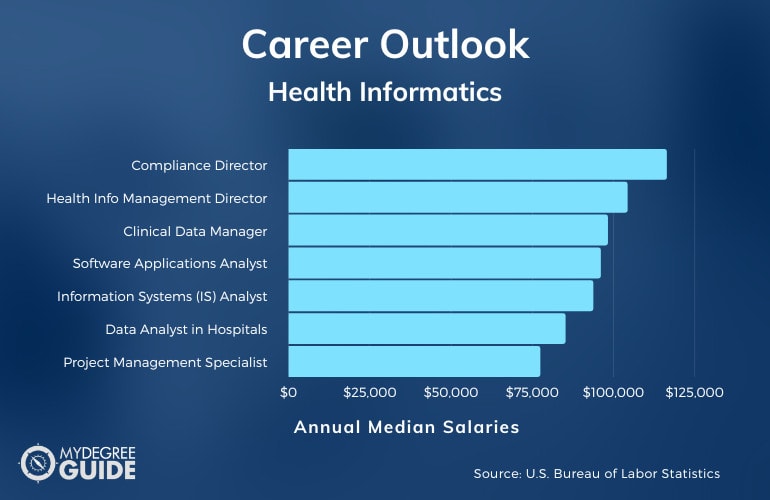If you’re looking for high-paying jobs in specialized, in-demand fields, a health informatics bachelor’s degree might be just what you need to get started with a lucrative career.

Editorial Listing ShortCode:
It can prepare you for multiple types of work, and if you choose an online program, your studies can be completed right at home.
Universities Offering Health Informatics Online Bachelor’s Degree Programs
Methodology: The following school list is in alphabetical order. To be included, a college or university must be regionally accredited and offer degree programs online or in a hybrid format.
1. Augusta University
- BS in Health Information Administration
Augusta University is accredited by the Commission on Colleges of the Southern Association of Colleges and Schools.
2. Colorado Technical University
- BS in Healthcare Management – Health Informatics
Colorado Technical University is accredited by the Higher Learning Commission.
3. Davenport University
- BS in Health Information Management
Davenport University is accredited by the Higher Learning Commission.
4. East Carolina University
- BS in Health Information Management
East Carolina University is accredited by the Southern Association of Colleges and Schools Commission on Colleges.
5. Ferris State University
- Bachelor’s in Health Information Management
Ferris State is accredited by Higher Learning Commission.
6. Franklin University
- BS in Health Information Management
Franklin is fully-accredited by the Higher Learning Commission.
7. Grand Canyon University
- BS in Health Informational Management
Grand Canyon University is accredited by the Higher Learning Commission.
8. Indiana University
- BS in Health Information Management
Indiana University is accredited by The Higher Learning Commission.
9. King University
- BS in Healthcare Administration
King University is accredited by the Southern Association of Colleges and Schools Commission on Colleges.
10. Liberty University
- BS in Informatics – Healthcare Informatics
Liberty University is accredited by the Southern Association of Colleges and Schools Commission on Colleges.
11. Louisiana Tech University
- BS in Health Informatics and Information Management
Louisiana Tech University is accredited by the Southern Association of Colleges and Schools Commission on Colleges.
12. Oregon Institute of Technology
- BS in Health Informatics
Oregon Institute of Technology is regionally accredited by Northwest Commission on Colleges and Universities.
13. Purdue University
- BS in Health Information Management
Purdue University is accredited by the Higher Learning Commission of the North Central Association of Colleges and Schools.
14. Rasmussen College
- Bachelor’s in Health Information Management
Rasmussen College is accredited by the Higher Learning Commission.
15. Southern New Hampshire University
- Bachelor’s in Health Information Management
Southern New Hampshire University is accredited by the New England Commission of Higher Education.
16. Southwestern Oklahoma State University
- BS in Health Information Management
Southwestern Oklahoma State University is accredited by the Higher Learning Commission of the North Central Association.
17. University of Central Florida
- BS in Health Informatics and Information Management
The University of Central Florida is accredited by the Southern Association of Colleges and Schools Commission on Colleges.
18. University of Cincinnati
- BS in Health Information Management
The University of Cincinnati is accredited by the Higher Learning Commission.
19. University of Mississippi
- Bachelor’s in Health Informatics and Information Management
The University of Mississippi is accredited by the Commission on Colleges of the Southern Association of Colleges and Schools.
20. University of South Carolina
- BA in Health Informatics
The University of South Carolina is accredited by the Southern Association of Colleges and Schools Commission on Colleges.
21. University of Southern Indiana
- BS in Health Informatics & Information Management
The University of Southern Indiana is accredited by the Higher Learning Commission.
22. University of Toledo
- BS in Health Information Administration
The University of Toledo is accredited by the Higher Learning Commission.
23. Weber State University
- BS in Health Information Management
Weber State is regionally accredited through the Northwest Commission on Colleges and Universities.
24. Western Governors University
- BS in Health Information Management
Western Governors University is accredited by the Northwest Commission on Colleges and Universities.
25. Western Kentucky University
- Bachelor’s in Health Information Management
Western Kentucky University is accredited by the Southern Association of Colleges and Schools Commission on Colleges.
Online Health Informatics Bachelor Degrees

Also known as “health information systems” or “health information technology,” health informatics is a tech-based field that’s devoted to the data of the medical industry. From patient records to hospital insurance forms, it can cover all of the administrative processes of a 21st century healthcare business.
As you might expect from a field that uses a lot of IT, business is booming. The world grows more digital by the day, and there’s an increasing demand for professionals who understand computer systems and networks.
Just how much demand is there? According to the U.S. Bureau of Labor Statistics, healthcare jobs are estimated to grow by 15 percent in the next decade. This includes analysts, informaticists and record keepers as well as doctors and nurses. It translates to a total of 2.4 million new jobs.
There are several ways that you can earn a healthcare informatics bachelor’s degree:
- You can obtain a bachelor of science (BS) in health informatics.
- You can get a bachelor’s degree in healthcare administration or healthcare management with an emphasis on health informatics.
- You can go for a bachelor’s degree in business with an emphasis in healthcare administration, systems management or information technology (IT) management.
- At some schools, you might have the option for a health sciences degree with a specialization in business, technology, management or information systems.
Different universities have different programs, so if you’re seeking a very specific degree, make sure that your school has it in the catalogue. They rarely offer all of these options at once.
Health Informatics Careers & Salaries

The American Health Information Management Association (AHIMA) reports that the average Health informatics bachelor degree salary is $63,000 per year for nonmanagerial positions.. This is just an average, however, and some jobs pay better than others.
As for the type of work that you’ll do, it depends on your interests. You can take an informatics degree and apply it to just about every sub-field of healthcare, including finance, administration, insurance, marketing and human resources.
According to the Bureau of Labor Statistics, some careers that you might consider with an informatics degree include:
| Careers | Annual Median Salary |
| Compliance Director | $116,350 |
| Health Information Management (HIM) Director | $104,280 |
| Clinical Data Manager | $98,230 |
| Software Applications Analyst | $96,040 |
| Information Systems (IS) Analyst | $93,730 |
| Data Analyst in Hospitals | $85,190 |
| Project Management Specialist | $77,420 |
| Revenue Cycle Manager | $66,130 |
| Health Informatics Specialist in Hospitals | $46,880 |
| Medical Coder | $43,890 |
There are many more, so don’t feel limited by the suggestions on this list. A health informatics bachelor’s degree can open doors in a variety of medical, technical and clinical fields.
In addition, pursuing a traditional or online master’s in health informatics would most likely see an increase in the average annual salary.
Health Informatics Curriculum & Courses

There’s no “one size fits all” when it comes to an informatics degree. Every school is different, especially since they classify healthcare informatics under various names and categories. A health information systems degree might not have the same prerequisites as a healthcare administration degree with an informatics concentration.
In a broad sense, however, many healthcare informatics programs cover the same topics:
- Introduction to Health Informatics: This is a basic, entry-level class that covers the fundamentals of the U.S. healthcare system and how digital technology has become critical to it.
- Data Analytics: Data is the backbone of informatics, and these classes teach how to find, store, analyze, organize, track and retrieve information from various sources and systems.
- Electronic Healthcare Systems: Contemporary healthcare professionals need to be familiar with the digital networks and systems that have replaced paper files. Expect to learn about things like electronic medical records (EMRs) and electronic health records (EHRs).
- Computer Science: You don’t have to be a computer expert to study health informatics, but tech-based classes can prepare you to handle the software and hardware of the industry.
- Business Administration: Business acumen can be a big benefit to healthcare informatics students who are dreaming of leadership positions within the industry.
- Privacy and Security: These classes tackle subjects like doctor-patient confidentiality as well as cybersecurity concerns for digital information systems.
- Information Technology: You’re probably familiar with information technology (IT) in the context of customer service, but it also plays an important role for healthcare professionals who work with files, databases, networks and computer systems.
- Ethics: Often given in conjunction with policy and regulation classes, ethics studies can prepare you for the complex web of moral and legal issues that are found in every aspect of the healthcare industry.
- Finance: This is another discipline where you’ll want to have a passing familiarity with its standards and practices even if you don’t plan on pursuing a career within it. As a healthcare informaticist, you never know when you’ll need budgeting, auditing or financial planning skills.
- Healthcare Coding and Classification: Also called “Medical Terminology” and “Clinical Coding,” these classes can teach you to speak the language of the medical field, especially as it pertains to its computer systems.
If you’re looking at online schools, you should also be aware that some informatics degrees have a face-to-face component. For example, you might need to complete an internship or capstone project in your final year. Talk to your college to see if their program is truly 100 percent online.
Choosing a Healthcare Informatics Degree

Which college has the best program for a healthcare informatics degree? It depends on what you’re looking for as a prospective student. The right choice for you might not be the right choice for someone else, so instead of having a rigid, inflexible set of criteria, approach the decision while keeping various things in mind.
- Degree: Does the school offer a bachelor’s in healthcare informatics, or does it have “information systems” as a concentration for other degrees like data science, healthcare administration or healthcare information technology?
- Accreditation: The university should be regionally or nationally accredited. If the healthcare department is programmatically accredited, that’s a bonus, but it isn’t a necessity.
- Online availability: There are different types of online degree programs, so even if your school offers healthcare informatics for distance learners, make sure that the program will suit you. For example, if you want self-paced courses where you make your own schedule, you should look for “asynchronous” classes instead of “synchronous” classes.
- Acceleration options: Are you hoping to join the workforce sooner rather than later? See if there are any acceleration options such as evening classes, summer semesters, equivalency credits or dual degree programs.
You might also want to look at things like tuition rates, acceptance rates, credit requirements and teacher-to-student ratios.
Admissions Requirements

Before you can get started with a bachelor’s degree in health informatics, you’ll need to be accepted by a college. This process can take anywhere from weeks to months, so don’t wait. Gather all of the necessary documents, including:
- Application: Every school will ask you to supply information about yourself, your family, your job and your income. It’s for financial aid purposes just as much as their records. If you plan on applying to multiple colleges, you can fill out a Common App to save this basic information for multiple applications.
- High school transcripts: Some colleges care about your GPA more than others. The same goes for specific departments within colleges. If you’re applying for a specialized degree program in something like business administration or data science, the admissions requirements might be stricter than usual.
- Test scores: While some colleges have been experimenting with a “test-optional” application process, most will still ask for your SAT/ACT scores. However, you can look for test-optional schools if this is a deal-breaker for you.
- Letters of recommendation: As an undergraduate, you’ll have a little leeway with these. Colleges will usually accept letters from teachers, counselors, coaches and community leaders as well as bosses.
- Personal essays: Essays are a chance to add a personal touch to your college application. Every school will have their own prompts, and you can research online to see samples of what they’ve asked in the past.
You’ll also want to check out the admissions deadlines of your chosen school. Some colleges have rolling admissions where they accept students year round, but it’s much more common for there to be set schedules for upcoming semesters.
Accreditation for an Online Bachelor’s in Health Informatics Degree

You’ve probably heard warnings about unaccredited schools, but you might be wondering what they are and why they matter.
Accreditation is a way for colleges to prove that they meet the educational standards set forth by the U.S. Department of Education. It’s a voluntary process, but if they don’t do it, they aren’t eligible to receive federal financial aid like FAFSA. This means that you can’t use it, either.
Another danger of unaccredited colleges is that they might not be recognized by employers, state boards, licensing programs or scholarship agencies. You’ll also have trouble transferring credits from an unaccredited school to an accredited one.
All things considered, it’s worth the effort of doing a little research and making sure that your university is accredited. There are three kinds in total:
- Regional accreditation
- National accreditation
- Programmatic accreditation
If you aren’t sure whether your school holds any of these accreditations, plug it into the searchable database at the Council for Higher Education Accreditation (CHEA).
Health Informatics Professional Organizations

Professional organizations are a great way to connect with others in your field. Many of them even have student memberships so that you can take advantage of their resources without having to pay full price.
Here are just a few names that might interest you as a student pursuing a health information technology degree:
- American Health Information Management Association: Offering everything from conferences to certification programs, AHIMA is for any healthcare professional that deals with issues of policy, privacy and technology.
- American Medical Informatics Association: AMIA is devoted to informatics, and members can access things like career boards, training programs, webinars, podcasts, symposiums, scholastic journals and more.
- American Nursing Informatics Association: Like its name suggests, ANIA is for nurses and other healthcare professionals who are interested in informatics. It offers a thriving industry network with more than 3,000 members and a wide variety of educational and professional resources.
- American Society of Health Informatics Managers: ASHIM is one of the leading providers of health informatics certifications, so if you’re looking to bolster your resume with some new credentials, this is the place to go.
- Healthcare Information and Management Systems Society: HIMSS is the overarching network for several different healthcare groups, including the Alliance for Nursing Informatics and the Health Technology Alliance.
- Workgroup for Electronic Data Interchange: Offering products, events, educational programs and news bulletins, WEDI is a one-stop shop for healthcare informatics professionals.
In addition to these IT groups, you might also be interested in organizations devoted to healthcare administration or healthcare management. They usually welcome informatics specialists within the healthcare field.
Health Informatics Licensing and Certification

A certification in health informatics can be a big help to your career. It isn’t a requirement, but it can prove your readiness for jobs that need special skills or work experiences, and it can add a little something to your resume when you’re competing against other job seekers.
Here are just a few certifications that can complement a bachelor’s degree in health informatics:
- CHISP Health IT Certification: The Certified Health Informatics Systems Professional (CHISP) will test you on the core competencies of the field. You’ll take an exam that covers topics such as policy, finance, healthcare regulations, data security and medical health billing.
- Registered Health Information Technician: The Registered Health Information Technician (RHIT) is for healthcare professionals who work with computers. You’ll need to meet certain educational criteria to register for the exam.
For more information on these certifications, contact the organizations that issue them.
Financial Aid & Scholarships

With the rising cost of college, financial aid is a necessity for many students. The good news is that you’ll have plenty of options when it comes to assistance.
The first step is to fill out the Free Application for Federal Student Aid (FAFSA). It’s a one-stop application that will determine your eligibility for several types of aid, including:
- Grants. You don’t have to pay back a grant, so it’s essentially free money for college. The most common is the Federal Pell Grant that awards up to $6,000 per academic year.
- Loans. Loans have to be paid back, but depending on your income, you might qualify for a subsidized loan. This means that the government will pay the interest while you’re in school.
- Work-study programs. These programs will connect you with part-time jobs on campus or with campus affiliates.
In addition to federal grants and loans, you might also qualify for state-based grants and loans. These are usually limited to state residents, so even if you’re attending an online university, you’ll need to live in the state where they’re offered.
Last but not least, consider scholarships to help you fund your college education. You don’t have to be an honor roll student to apply. There are many “need-based” scholarships for low-income students of all GPAs, and you can also find scholarships meant specifically for a bachelor’s in healthcare informatics.
You might also look for information technology scholarships that accept healthcare informatics as a viable area of study.
What Degree Do You Need for Health Informatics?

You’ll have several options for a degree in healthcare informatics, including:
- A bachelor’s degree in health informatics
- A bachelor’s degree in healthcare administration or healthcare management with a sub-specialty in informatics
- A bachelor’s degree in business administration with a concentration in healthcare systems or healthcare information technology
You can also look for something like a health information systems degree if you already have a specialized area of focus.
What Can You Do With a Degree in Health Informatics?

Since it’s an administrative field, most health informatics jobs will put you behind a desk. However, you’ll have plenty of choices for where that desk is and what you do with it.
For example, if you’re good with numbers, you might pursue a finance-related career in risk management or revenue cycles. If you’re comfortable working with large amounts of information, you might become a data analyst. If you’re highly efficient in office settings, you might become an administrator or department director.
There are even creative jobs for health informatics specialists. You might become a software developer or content marketer who works in the healthcare industry and creates, sells or distributes new products.
Is Health Informatics a Good Major?

Everyone has their own definition of a “good” major, but the study of health informatics can definitely pay off. It’s a fast-growing field with a lot of opportunity, especially for those who have a multidisciplinary interest in things like business, healthcare, administration, computer science and technology.
A healthcare informatics degree can allow you to study all of these things at once.
How Much Is the Salary of Health Informatics?
A health informatics bachelor degree salary starts at $63,000 per year on average, according to the American Health Information Management Association (AHIMA). The exact size of your paycheck will depend on your job, location and credentials.
For example, if you’ve been certified as a healthcare systems technician, you might make more money than someone without that designation.
Are There Any Affordable Online Health Informatics Degree Programs?

There are many affordable online programs for healthcare informatics. In fact, when you get your degree online, you can often avoid student fees that don’t apply to distance learners. For example, you won’t need to pay for housing or parking.
Another thing to consider is residency rates. Some universities will charge in-state rates for online students regardless of where they actually live, so that’s an additional way to save.
How Long Does it Take to Get a Bachelor’s in Health Informatics?
It typically takes four years to get a bachelor’s degree. This is assuming that you’re a full-time student who attends school year round.
If you want to speed up your graduation date, look into accelerated programs that will allow you to earn a bachelor’s degree in three years or less. They offer things like evening and summer classes to help you earn credits faster.
If you’re interested in getting a master’s degree someday, you might also consider a dual degree program that will combine your bachelor’s and master’s studies into a single, five-year program.
How Much Does a Bachelor’s in Health Informatics Online Degree Cost?

A bachelor’s degree usually requires 120 credits to graduate. Since colleges charge by the credit, the cost of your degree will depend on how expensive the credits are when multiplied by 120.
- $300 per credit x 120 credits = $36,000
- $500 per credit x 120 credits = $60,000
- $1,000 per credit x 120 credits = $120,000
However, the trick to choosing a high-value degree program is to consider the overall worth of the degree rather than just its cost. How much is tuition? How much is the average salary for the career that you’re considering? What will be your return on investment (ROI) after five years of working?
Getting Your Health Informatics Degree Online

If you’re curious about the intersection of healthcare and technology, consider a healthcare informatics bachelor’s degree.
Not only can it prepare you for work in a dynamic, ever-changing field, but thanks to the growing demand for computer-savvy healthcare administrators, it can offer many career possibilities for the future.
